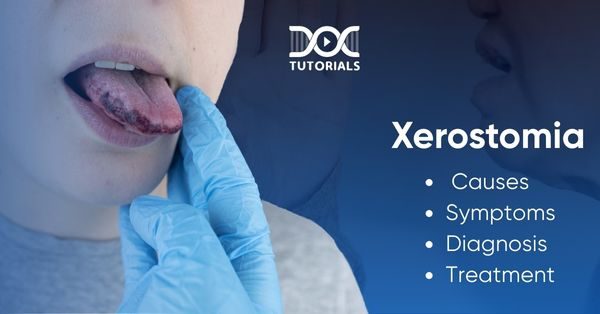Xerostomia: Causes, Symptoms, Diagnosis, and Treatment

Saliva is crucial in maintaining oral health by neutralising acids, washing away food particles, and preventing infections. But despite its presence, around 5.5-46% of the general population suffer from xerostomia or dry mouth.
Without sufficient saliva, individuals with xerostomia may suffer from bad breath, cavities, and digestive issues. Read ahead to learn more about xerostomia, its causes, symptoms, and treatment options.
What is Xerostomia?
Xerostomia, commonly known as dry mouth, occurs when the salivary glands fail to produce enough saliva, leading to discomfort and complications in oral health. This persistent dryness can disrupt everyday functions like speaking, chewing, swallowing, and even digestion.
While occasional dryness isn’t a cause for concern, persistent cases require medical attention. This guide explains the causes, symptoms, and treatment options that are key to managing xerostomia effectively.
Causes of Xerostomia
There are several reasons for dry mouth, ranging from lifestyle habits to medical conditions. Some of the major xerostomia causes include:
1. Medications
One of the leading dry mouth causes is medication use. Hundreds of prescription and over-the-counter drugs list dry mouth as a side effect. These include:
- Antihistamines (used for allergies)
- Antidepressants and antianxiety medications
- Diuretics (used for high blood pressure and heart conditions)
- Decongestants
- Pain relievers
- Chemotherapy drugs
2. Dehydration
Insufficient fluid intake can lead to dryness of the mouth. Dehydration is often caused by:
- Not drinking sufficient water
- Excessive sweating
- Fever
- Vomiting or diarrhoea
- Excessive alcohol or caffeine consumption
3. Aging
Older adults are more prone to mouth dryness due to various health conditions and the long-term use of medications. Xerostomia causes in the elderly include:
- Natural decrease in saliva production
- Higher likelihood of taking medications with dry mouth as a side effect
- Chronic health conditions
4. Smoking and Alcohol Consumption
Both tobacco and alcohol contribute to dryness in the mouth. Smoking reduces saliva flow, and alcohol acts as a diuretic, leading to dehydration. These habits are significant mouth dryness causes and can worsen existing xerostomia.
5. Medical Conditions
Certain diseases can cause mouth dryness, including:
- Diabetes: Uncontrolled blood sugar levels can cause dryness in the mouth.
- Sjögren’s Syndrome: An autoimmune disease that attacks the salivary glands.
- Stroke and Alzheimer’s Disease: These conditions can impair the body’s ability to produce saliva.
- HIV/AIDS: Human immunodeficiency virus (HIV) and acquired immunodeficiency syndrome (AIDS) affect the salivary glands and can cause severe dry tongue.
6. Radiation Therapy
Patients undergoing cancer treatments involving radiation to the head or neck may experience xerostomia due to damage to the salivary glands. This can lead to permanent dry mouth if the glands are severely affected.
7. Nerve Damage
Any injury to the head or neck affecting the nerves responsible for salivary gland function can be a mouth dryness reason. Nerve damage can result from trauma, surgery, or certain neurological conditions.
8. Mouth Breathing
Habitual mouth breathing, especially while sleeping, can contribute to a dry tongue and dry mouth reasons. This is often caused by nasal congestion, sleep apnea, or anatomical issues such as a deviated septum.
Persistent dryness in the mouth could indicate an underlying health issue. It may be associated with diabetes, autoimmune disorders, or even stress and anxiety. If you notice chronic mouth dryness, consult a healthcare professional to determine its cause and appropriate treatment.
Symptoms of Xerostomia
The symptoms of xerostomia vary in intensity but commonly include:
- Persistent dryness of the mouth
- Difficulty in chewing, swallowing, or speaking
- A burning sensation in the mouth or throat
- Cracked lips and sores in the mouth
- A dry tongue that feels rough
- Increased thirst
- Bad breath due to bacterial overgrowth
- Frequent sore throat
Diagnosis of Xerostomia
A healthcare provider will assess your dry mouth symptoms through:
- A thorough review of your medical history
- Salivary gland function tests
- Blood tests to check for underlying conditions
- Imaging studies if nerve damage is suspected
Prevention of Xerostomia
Preventing xerostomia can help maintain overall oral health and reduce discomfort. Some preventive strategies include:
- Regular dental checkups to detect early signs of dryness in the mouth.
- Practising good oral hygiene by brushing and flossing daily.
- Avoid sugar-heavy foods and drinks that contribute to cavities and worsen dry tongue.
- Using fluoride toothpaste and mouthwashes to strengthen teeth and prevent decay caused by mouth dryness.
- Managing underlying health conditions that can contribute to dry mouth reasons.
Treatment Options for Xerostomia
Effective dry mouth treatment depends on its underlying cause. However, several strategies can help manage xerostomia and improve overall comfort.
Lifestyle and Home Remedies
- Increase Hydration: Drinking plenty of water throughout the day helps keep the mouth moist and prevents discomfort caused by dryness. Sipping water frequently, especially during meals, can aid in chewing and swallowing.
- Chew Sugar-Free Gum or Suck on Sugar-Free Candy: These stimulate saliva production, which naturally alleviates dry mouth symptoms. Xylitol-containing gum or lozenges may be particularly beneficial.
- Use a Humidifier: Dry indoor air, especially during colder months, can exacerbate mouth dryness. Running a humidifier at night adds moisture to the air, helping to keep the mouth and throat from becoming excessively dry.
- Avoid Caffeine and Alcohol: Both caffeine and alcohol contribute to dehydration, which can worsen dry mouth symptoms. Limiting or avoiding coffee, tea, alcoholic beverages, and even certain mouthwashes with alcohol can be helpful.
- Quit Smoking: Tobacco use is a major factor in dry mouth and can further irritate oral tissues. Stopping smoking can improve saliva flow and overall oral health.
- Consume Moist Foods: Eating foods with higher moisture content, such as soups, yoghurts, fruits, and vegetables, can temporarily relieve dry mouth and make eating more comfortable.
By incorporating these habits, individuals experiencing xerostomia can manage symptoms effectively and improve their oral health.
Medical Treatments
- Saliva Substitutes: Artificial saliva products help with mouth dryness reasons.
- Medications: Drugs like pilocarpine stimulate saliva production.
- Addressing Underlying Conditions: Treating diabetes, Sjögren’s syndrome, or other causes of sudden dry mouth can alleviate symptoms.
FAQs about Xerostomia
- What are the common dry tongue causes?
Dry tongue can result from dehydration, which reduces saliva production. Certain medications, such as antihistamines and antidepressants, can cause dry tongue as a side effect. Nerve damage from injury or surgery may also impair saliva flow, contributing to dryness.
- What is a dry mouth a sign of?
Chronic dry mouth can be a symptom of underlying health conditions such as diabetes, which affects saliva production, or autoimmune diseases like Sjögren’s syndrome, which attacks moisture-producing glands. Medication side effects, including those from blood pressure drugs and antidepressants, are also common causes.
- What are some natural remedies for dry mouth?
Drinking plenty of water throughout the day can help maintain moisture levels in the mouth. Chewing sugar-free gum or sucking on sugar-free lozenges stimulates saliva flow. Avoiding alcohol, tobacco, and caffeine, which contribute to dryness, can also provide relief.
- Can anxiety cause dry mouth?
Yes, anxiety and stress can trigger dry mouth by affecting the nervous system and reducing saliva production. When the body is in a state of stress, it activates the fight-or-flight response, which may lead to reduced saliva flow and a sensation of dryness.
- Are there specific foods that help with dry mouth?
Moist foods such as soups, stews, yoghurt, and fruits with high water content, such as melons and cucumbers, can help combat dry mouth. Avoiding salty, dry, or spicy foods can prevent further irritation. Sugar-free popsicles or ice chips can also provide temporary relief.
- How long does dry mouth last?
The duration of dry mouth depends on its cause. If it results from dehydration, drinking water can resolve it within hours. However, chronic conditions such as medication side effects, diabetes, or autoimmune diseases may require ongoing treatment and long-term management.
Conclusion
Xerostomia is a common yet bothersome condition that affects oral health and overall well-being. Identifying the cause of mouth dryness early and seeking appropriate treatment can improve the quality of life. If you experience persistent mouth dryness, consult a healthcare provider to determine the cause and find the best treatment options.DocTutorials provides resources and expert-led discussions to help medical students better grasp these medical concepts. Join our NEET PG courses today and solidify your future as a successful medical professional.
Latest Blogs
-

NEET PG Exam 2025- Date, Pattern, Marking Scheme, Subject Wise Weightage, and Exam Mode
NEET PG Exam 2025 is the ultimate gateway for medical graduates aspiring to pursue postgraduate courses in medicine, including MD,…
-

INI CET Exam 2025: Your Roadmap to Success – Key Topics, Strategies, and Lessons from Last Year’s Papers
The INI CET exam is more than just a test; it’s a significant milestone for many medical students aiming to…
-

INI CET Exam Success: Previous Year Question Papers & Ultimate Guide – INI CET PYQ
One can feel overwhelmed while preparing for the INI CET (Institute of National Importance Combined Entrance Test). A vast syllabus,…




